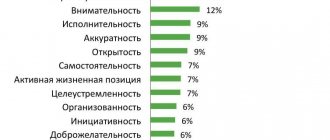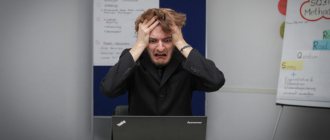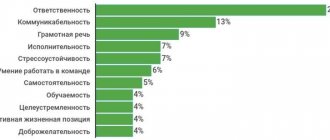Competently writing a resume will serve a person well when applying for a job . This document should be written in such a way that it intrigues a potential employer. In addition to education and work experience, personal qualities are very important in a resume. Examples and life experience show that it is this information that is of serious interest to managers and personnel officers.
Important points
Before indicating personal qualities in your resume, you must carefully study the samples and examples in order to fill out the required section according to all the rules:
- The information must be truthful and reliable, since the deception will still be revealed sooner or later, so there is no need to “philosophize with the crafty.”
- Personal qualities should be stated clearly and briefly, but you should not use only general, hackneyed phrases that will not give a potential employer complete information about your strengths and weaknesses.
- This section must be written correctly, without colloquial vocabulary or errors.
- As a rule, you need to indicate the most important personal qualities (5 options), so you should not be too zealous in indicating everything. It is necessary to analyze everything and enter only those character traits that will really be useful for a vacant position or profession. For example, a salesperson will need the ability to resolve conflict situations, but this is not at all necessary for an economist.
Which ones are worth mentioning and which ones are not?
Very often you can hear the question from candidates: what positive and negative qualities should they name during an interview?
Employers are interested in employees with character traits such as:
- determination;
- organization;
- initiative;
- diligence;
- creativity;
- goodwill;
- determination.
Tell us about them if you really have them. Give examples.
Often during an interview you are asked to name three negative qualities and three positive qualities. Think about this point in advance.
There is no need to say that you are professional, adequate, loyal, smart, charming. Other people can notice and name such qualities when talking about you, but not you yourself.
Never mention negative characteristics such as laziness, disorganization, short temper and the like.
In general, 3 negative qualities in an interview are, first of all, self-doubt, fear of the interlocutor and insincerity.
Groups and Templates
Personal qualities for a resume can be divided into several groups, which have their own specific patterns.
- Work and job responsibilities: discipline, ability to adapt, responsibility, determination, analytical skills, dedication, high performance.
- Relationships with people: friendliness, sociability, competent speech, politeness, fairness, ability to persuade and work in a team, non-conflict and stress tolerance.
- Development and creative thinking: desire to improve oneself, resourcefulness, creative approach, creativity, desire for development, easy learning.
- Character traits: cheerfulness, decency, punctuality, activity, accuracy, attentiveness, perseverance.
First job
If your career is just beginning and your resume is being compiled for the first time, then the section on personal qualities can be filled out as follows:
- Desire to work fruitfully in a team.
- Creative approach to business and creativity.
- Activity.
- Good memory.
- Easy to learn.
- Desire to improve and learn.
For a specific vacancy, you need to determine your priority options for personal qualities - depending on the proposed position and profession.
Weaknesses and professional qualities
Each applicant must correctly focus his weaknesses on the profession in which he wants to work. For example, a design engineer or future accountant might write the following:
- Lack of diplomacy.
- Inflated sense of responsibility.
- Integrity.
- Lack of flexibility in business matters.
- Self-love.
- Difficulty making contacts with new people.
- Inability to lie.
- Modesty.
- Pedantry.
- Straightforwardness.
- Excessive demands on yourself.
- Increased anxiety.
- Excessive scrupulosity.
- Mistrust.
Although such a list is not at all suitable for a person who must constantly communicate with people in the process of work. For example, a future sales manager might provide the following negative qualities for a resume:
- Excessive sociability.
- Workaholism.
- Straightforwardness.
- Mistrust.
- The need for external motivation.
- Impulsiveness.
- Restlessness.
- Self-confidence.
- Hyperactivity.
An applicant for a leadership position needs to prepare more thoroughly before filling out the column that will indicate his weaknesses. He can write about the following character traits:
- Excessive demands on others.
- Planning and thinking about work takes up a lot of free time.
- I find fault with little things.
- Pedantic.
- Overly emotional.
- The following formulations can be considered successful:
- Distrustful of people.
- Tends to make decisions based on his own opinions.
- I don’t respond to rudeness with rudeness.
- A good option would be:
- I don't like to do something to please others.
- Slow.
- I'm annoyed by the clutter.
- I am prone to formalism and pay excessive attention to detail.
- They have a hypertrophied sense of responsibility.
- I always look for confirmation of words.
- Hot-tempered.
- Straightforward.
- I can raise my voice at subordinates.
- Overly trusting.
Deceit is the success of the false ego
A clear manifestation of one’s own insecurity, a desire to impress others, even if this means using a lie. A deceitful person comes up with false information, presenting it as reality. The consequences are very sad: distrust of others, loneliness, loss of work, because few forgive lies. If a person constantly lies, over time he himself will become entangled in lies and will certainly be exposed.
Often, a liar simply does not want to, does not know how to perceive reality, and deliberately creates a distorted image of himself, events and facts among others in order to achieve a selfish goal and prevent the negative consequences of his deed.
Little tricks
To prevent an employer from immediately trashing your resume after reading about your shortcomings, don't be too open. Neutral qualities that cannot in any way affect future work are quite suitable. The following personal qualities (disadvantages) are suitable for almost any vacancy:
- Fear of airplanes.
- Ophidiophobia (fear of snakes).
- Vespertiliophobia (fear of bats).
- Arachnophobia (fear of spiders).
- Love for sweets.
- Lack of experience.
- Love for shopping.
- Excess weight.
When is a comma placed after “such/such”?
Now let’s figure out when a comma is placed inside the phrase “such/such as”:
1 when in the sentence before the turn there is a negation with the particle “not” ;
My hearing is no longer as sharp as when I was young.
My level of English is not what I would like.
2 when the sentence contains a comparative phrase , where the word “such/such” acts as a demonstrative.
With illnesses like yours, I recommend getting outdoors more often and monitoring your cholesterol levels.
My house will be like Scarlett O'Hara's from Gone with the Wind!
Strengths in your resume
To get a decent job, you need to provide an excellent reference and profile. When indicating your positive aspects in your resume, you need to adequately evaluate yourself professionally and enter only the best qualities in the required fields, which, without a doubt, will be appreciated by the employer. A sample list of strengths is as follows:
- Energy.
- Honesty.
- Sense of humor (a sign of intelligence).
- Determination.
- Good diction.
- Ability to persuade.
- Mobility.
- Ability to work in one team.
- Self confidence.
- Hard work.
- Ability to think creatively.
- The desire for self-improvement and professional development.
- Stress resistance.
- Ability to make decisions independently and quickly.
- Justice.
- Scrupulousness.
- Self-criticism.
- Independence.
- Self-control.
- Innovation.
- Punctuality.
- Integrity.
- Enterprise.
- Presentable appearance.
- Decency.
- Responsibility.
- Responsiveness.
- Organized.
- Result-oriented.
- Oratory.
- Organizational skills.
- Optimism.
- Non-conflict.
- Resourcefulness.
- Reliability.
- Persistence.
- Communication skills.
- Creativity.
- Performance.
- Friendliness.
- Conscientiousness.
- Discipline.
- Flexibility.
- High efficiency.
- Politeness.
- Attentiveness.
- Fast learner.
- Ambition.
- Analytic skills.
- Accuracy.
- Activity.
You should also indicate your business characteristics, which should be described in one sentence, for example: “Seven years of work as a chief accountant.” It is important to ensure that personal and business qualities do not conflict with each other.
How and at what stage the basic personal characteristics of a person are formed
Psychotherapists, doctors and psychologists agree that a person’s personality is established before the first 5 years of life. The child begins to separate himself from the outside world and identify his “I” already at 3 years old. This, by the way, is one of the main reasons why this age is called the most difficult. The child’s whims and those qualities that were previously not noticed in him appear. This is a completely natural process that all parents should be prepared for. Many mothers begin to fear that the child has stopped loving them, however, this is not so - the little person just finds his own “I” and tries to affirm it with all his might. Then the period of conflict with the outside world subsides and the child integrates into the environment with an already established character.
As for adults, everything is relatively clear here. As a person progresses through life, he strengthens his character and habits, making them more stable and permanent.
Several examples of job descriptions
Accountant
Required qualities: responsibility, learning ability, attentiveness.
Will be well appreciated: scrupulousness, non-conflict, resistance to stress.
Sales Manager
Required qualities: result orientation, activity, communication skills.
Will be well appreciated: competent speech, innovative thinking, resistance to stress.
Secretary
Mandatory qualities: diligence, accuracy, resistance to stress, competent speech.
Will be well appreciated: neatness, well-groomed, pleasant appearance.
Checking the veracity of what is written
Most job seekers tend to embellish their resumes, so employers invite applicants for interviews and ask additional questions that help reveal a person better.
For example, they will want to know your opinion on a specific conflict, and based on the answers received, they will conclude how truthful the answers in your resume are regarding squabbles and scandals.
There are a number of simple rules to remember when interviewing:
- When talking to a person, you need to look him in the eye.
- Try not to look away while talking.
- You need to listen to your interlocutor’s questions to the end.
- Speak clearly and calmly.
- Don't indulge in familiarity by making cutting jokes.
- Try to intrigue and surprise the employer with your knowledge that is directly related to the desired position.
Advice from professional personnel officers
Focusing on the following advice from professional personnel officers, you can quite easily please your future bosses:
- The resume should be written in a discreet manner, and humor is inappropriate here. However, creative and creative positions may involve this.
- Copied, template resumes will not bring success, since personnel officers see such tricks right away.
- Five professional characteristics will be enough. Among them, stress resistance is always highly valued.
- You should indicate only the necessary qualities for the desired position.
- You need to answer questions only to the point. It won’t be possible to chat up the HR officer, but the impression of the applicant will be ruined.
In order to attract the attention of the employer, it is very important to think through all the points of the resume that relate to the personal qualities of the applicant. Correct completion of this document will guarantee your employment.
Originally posted 2018-03-29 05:50:00.
What does a person's character depend on?
Scientists have been studying human behavior in various life situations for a long time. Numerous studies have shown that people's character traits depend primarily on genetics, and only then on upbringing. In addition, some aspects of behavior are determined by a person's body type. Thus, the famous scientist Ketchmer was able to describe three body types of people with certain character traits.
Thin, tall people with elongated facial features belong to the group of asthenics. They have underdeveloped muscles and poor physical fitness. Asthenics are always serious and do not adapt well to new conditions. Such people practically do not let anyone in to their inner world. Bad character traits of an asthenic person are anger, stubbornness, rudeness, greed. At the same time, people with this body type are distinguished by high mental development. A huge number of scientists belong specifically to the group of asthenics. Most of them devote a lot of time to their careers, but do not pay attention to ordinary human relationships. Many people prefer to live alone and never start a family.
Athletics are broad-shouldered people with good physical fitness and a beautiful figure. Most athletes belong to this group. These people have a pleasant appearance. They are rarely impressionable and practically do not show their emotions through facial expressions. The character traits of people from this group are quite diverse. Athletes are often selfish. They know that in any case they will get what they want. On the other hand, they are very kind. They rarely leave loved ones in trouble.










